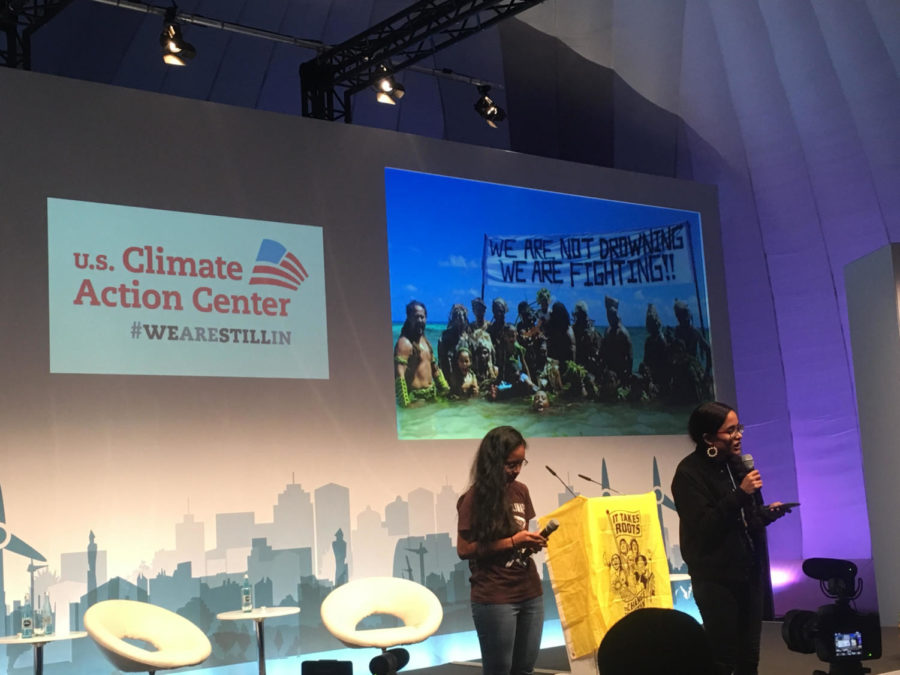Dickinson Students Attend UN Negotiation on Climate Change in Bonn, Germany
Dickinson students Espoir DelMain ’21 and Sophie Kivlehan ’21 were two of approximately to 20,000 people who spent close to two weeks in Bonn, Germany, attending United Nations (UN) negotiations on climate change and protection.
Kivlehan is one of twenty-two youth plaintiffs involved in a civil rights case against the United States government, titled Juliana, et al. v. United States, et al. which was filed in August 2015. In an article by the Morning Call, Kivlehan is quoted saying that the case “assert[s] that the government is violating our constitutional right to life, liberty and property by approving emissions of fatally high levels of carbon dioxide into the atmosphere, despite being aware of its damaging effects.”
Kivlehan spoke at a “TV talk show disguised as a press conference” at the Conference of Parties (COP), called Climate Matters, along with her grandfather, renowned climate scientist, Dr. James Hansen. The title of this segment was “Young People’s Burden: Averting Climate Disaster.” A recording of this conference is available online by the United Planet Faith and Service Initiative, who write that Kivlehan and Hansen “confront the world leaders with the truth of the burden being placed on young people.”
While on this panel, Kivlehan showed “a few minutes of a speech given by 12-year-old Severn Suzuki 25 years ago at the first Rio Earth Summit; a plea to adults to take actions to avoid dangerous climate change. Then,” Kivlehan continued, “my grandfather and I will take an objective look at the response of the world to her plea, and I will make my own plea to today’s adults but I will argue that young people must do more than plea, we must demand our rights.”
DelMain attended this presentation by Kivlehan and Hansen, but was at the COP for a different reason. She was able to attend the COP through a youth delegation formed by an organization from Minnesota, and was among top scientists and political leaders who come together annually in November and May to discuss the climate, even sitting at a table with Patricia Espinoza, the United Nations Framework Convention on Climate Change (UNFCCC) executive secretary. Though DelMain was not a negotiator herself, this experience granted her a firsthand look at how the United Nations functions, especially regarding the climate.
“It was confusing,” DelMain said of UN protocol. “Since eighth grade when I first learned about the UN, it’s created to be this all-knowing, perfect, beautiful group, but they have group chats, they use Google Docs, they’re normal people and they don’t necessarily get that much done.” The formality of the UN, she realized during this trip, often held back the conversation, but DelMain is hopeful that the convention will be more of an open forum next year.
Despite being held at the World Conference Center Bonn in Germany, the COP was presided over by the Fijian government. “In Fiji,” DelMain began. “There’s a tradition of the Talanoa dialogue where you sit around in a circle and it’s all about listening and solidarity and being together and voicing problems and solutions.” This will allow for more open and inclusive dialogue at future COPs, like next year’s, for which the Talanoa dialogue is already “officialized” as the mode of communication.
DelMain believes that this kind of conversation will open the door for “non-party stakeholders [to be involved] so you don’t have to be a fancy person who has the badge to say [things], which is exactly what [DelMain] thinks there needs to be more of in the UN.”
DelMain attended this conference as part of a delegation sent by Climate Generation, a nonprofit in her home state of Minnesota whose program, Youth Environmental Activists in Minnesota” she was a part of throughout high school. This program is “a council of leaders of all the high school environmental clubs in the Twin Cities in Minnesota,” DelMain explained.
Being part of this delegation allowed DelMain to arrive in Germany before the COP even started, to attend the thirteenth annual UN facilitated Conference of Youth (COY 13), “a space for youth to … write something to go to the COP.” There were more than 1000 late teens and early adults there from all over the world, according to the COY 13 website, and DelMain was one of them.
Of the event as a whole, DelMain described it as a “really amazing experience,” and stated that her biggest takeaway “was that negotiations in spaces like that can only do so much in the world, and while they do have a lot of power bureaucratically, those things aren’t going to change unless people on the ground say “this is what needs to change” because if no one else is doing anything, they won’t know what kinds of policies and regulations to put in place.”
She continued saying, however, that “at the same time, grassroots people also need to be connected to the UN so that they can be part of the same movement.” For anyone looking to be more involved, DelMain suggests “looking at climatetracker.org, because they simplify everything that happens in the UN … and apply[ing] to be a part of delegations because it’s really powerful to be there.”






